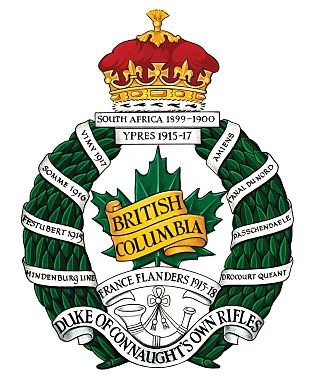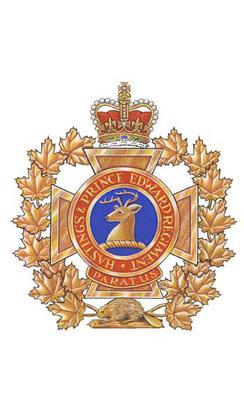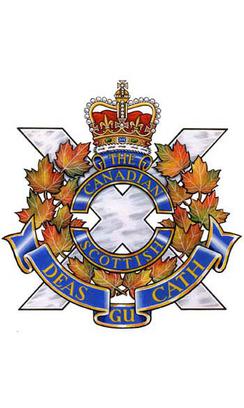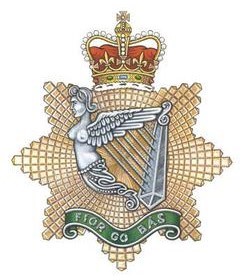
The 1st Canadian Division is a joint operational command and control formation based at CFB Kingston, and falls under Canadian Joint Operations Command. It is a high-readiness unit, able to move on very short notice, and is staffed and equipped to meet Canada’s military objectives to counter any potential threat.

The 12e Régiment blindé du Canada is a Canadian Army armoured regiment based in CFB Valcartier, on the outskirts of Quebec City. The regiment has both a Regular Force and a Primary Reserve unit. The 12e Régiment blindé du Canada's abbreviation is 12e RBC.
The Canadian Expeditionary Force (CEF) was the expeditionary field force of Canada during the First World War. It was formed following Britain’s declaration of war on the German Empire on 15 August 1914, with an initial strength of one infantry division. The division subsequently fought at Ypres on the Western Front, with a newly raised second division reinforcing the committed units to form the Canadian Corps. The CEF and corps was eventually expanded to four infantry divisions, which were all committed to the fighting in France and Belgium along the Western Front. A fifth division was partially raised in 1917, but was broken up in 1918 and used as reinforcements following heavy casualties.

The British Columbia Regiment (Duke of Connaught's Own) is a Primary Reserve armoured reconnaissance (recce) regiment of the Canadian Army; the regiment is subordinate to 39 Canadian Brigade Group of the 3rd Canadian Division. Established in 1883, it is the oldest military unit in Vancouver, British Columbia, Canada. It parades at the Beatty Street Drill Hall at the corner of Dunsmuir and Beatty in Downtown Vancouver. The regiment has been variously designated as garrison artillery, rifles, infantry, and armoured, but has been reconnaissance since 1965. It has received 41 battle honours in its history, and has been a unit of the Royal Canadian Armoured Corps since 1942.

The Hastings and Prince Edward Regiment is a Primary Reserve infantry regiment of the Canadian Army. The regiment is part of 33 Canadian Brigade Group, one of four brigade groups of 4th Canadian Division. The regimental headquarters and one company are at 187 Pinnacle Street in Belleville and on Willmott Street in Cobourg, with another rifle company in Peterborough. The Peterborough Armoury houses what was traditionally B Company or Moro Company. Moro Company also serves as the headquarters for the regiment’s Assault Pioneer Platoon. Normally, the regiment deploys as a composite, Ortona Company, while the headquarters and administration form Somme Company.

The Brockville Rifles is a Primary Reserve infantry regiment of the Canadian Army. The unit is a part of the 33 Canadian Brigade Group, 4th Canadian Division. It is fifteenth in the order of precedence of Canadian Army Infantry Regiments.

The Algonquin Regiment (Northern Pioneers) is a primary reserve infantry regiment of the Canadian Army comprising two companies. A Company is located in North Bay, Ontario, and B Company is located in Timmins, Ontario. The regiment falls under the command of the 4th Canadian Division's 33 Canadian Brigade Group.

The Canadian Scottish Regiment (Princess Mary's) is a Primary Reserve infantry regiment of the Canadian Army based on Vancouver Island in British Columbia.
The 125th Battalion, CEF was a unit in the Canadian Expeditionary Force during the First World War.

The 133rd Battalion, CEF was a unit in the Canadian Expeditionary Force during the First World War.
The 215th Battalion, CEF was a unit in the Canadian Expeditionary Force during the First World War.
The 226th Battalion, CEF was a unit in the Canadian Expeditionary Force during the First World War.

The Irish Regiment of Canada is a Primary Reserve infantry regiment of the Canadian Army based in Sudbury, Ontario. It is part of the 4th Canadian Division's 33 Canadian Brigade Group. Currently one battalion of the regiment exists.
The 26th Field Artillery Regiment, Royal Canadian Artillery, is a Canadian Army Primary Reserve artillery regiment based in Brandon and Portage la Prairie, Manitoba. 71 Field Battery, Headquarters and Service Battery, and Regimental Headquarters are in Brandon (49.8418°N 99.9532°W), and 13 Field Battery is in Portage la Prairie (49.9765°N 98.2875°W). Together with 10th Field Artillery Regiment, RCA and 116th Independent Field Battery, RCA, it forms the 38 Artillery Tactical Group within the 38 Canadian Brigade Group of 3rd Canadian Division.

Permanent Active Militia (PAM), also known as Permanent Force (PF), was the proper name of Canada's full-time professional land forces from 1855 to 1940, when it was reorganized into the Canadian Army. PAM was in effect Canada's standing army, consisting of one regular infantry regiment and two cavalry regiments in 1914.

The 12th Manitoba Dragoons is an armoured regiment of the Canadian Army that is currently on the Supplementary Order of Battle.
49th Field Artillery Regiment, RCA, is a Canadian Forces Primary Reserve regiment based in Sault Ste. Marie, Ontario. The regiment is part of 4th Canadian Division's 33 Canadian Brigade Group.
The 1st Battalion, Canadian Mounted Rifles, CEF, was an infantry battalion of the Canadian Army. Raised for service during the First World War as part of the Canadian Expeditionary Force (CEF), it was formed in November 1914, in Brandon, Manitoba. Originally a mounted infantry unit named the 1st Regiment, Canadian Mounted Rifles, CEF, which was expanded, following its rerolling and dismounting as an infantry unit, by absorbing other units of the Canadian Mounted Rifles (CMR).
The 56th Field Artillery Regiment, Royal Canadian Artillery is a Canadian Army Reserve artillery regiment based in Brantford, Ontario. The regiment is currently part of 4th Canadian Division's 32 Canadian Brigade Group.
The 42nd Field Artillery Regiment, RCA is a Canadian Army Reserve artillery regiment based in Pembroke, Ontario. It is part of the 4th Canadian Division's 33 Canadian Brigade Group.











